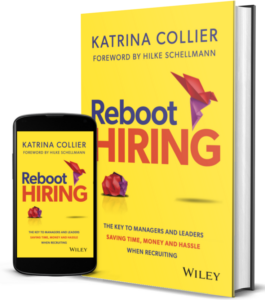Can you substitute a recruiter with AI?
Matt Ballantine wrote in a post last week:
People will not be replaced by AI, but they might be substituted by technology.
He went on to explain, “The distinction is important because the former implies a like-for-like swap. If you think you can take Bob or Sue out of your organisation and simply drop in an AI machine, you’ll be disappointed. Substitution requires reworking at the edges. If you are going to substitute humans with AI you’ll inevitably have to restructure how your organisation works, and that will inevitably mean changing how Bob and Sue’s former colleagues work. Getting people to change how they work is the same problem we’ve always had. AI won’t make that go away or make it any easier or harder.“
In conversations with vendors, I’m always curious who will admit that they are substituting TA pros with HR Tech or if they will continue the line of ‘I am helping them be more efficient through automation of tasks’ without seeing the big picture.
The reality is that if a team can use technology to hire the same volume with fewer recruiters then the number of employed recruiters, in most cases, reduces. You only need to assess the HR tech vendor’s case studies to see what it could mean for you and your team.
Of course, the substitution of repetitive tasks to technology is inevitable. As I have written before, companies need to ‘do more with less‘ to keep profits high and appease boards, investors and shareholders.
What matters is how you become one of those less likely to be let go when they decide to reduce headcount. You have a choice: keep your head in the sand hoping it won’t happen or make a game plan.
When I consider the recruiters I would never substitute out of my (fictitious) talent acquisition team, several human qualities jump out.
1. Critical thinkers are hard to substitute
They are critical thinkers to the core. Erin E Rupp breaks critical thinking down into these 9 characteristics (click through to read how to develop them).
- Curiosity – not only of information but also our internal thought processes.
- Analytical – can break down complex information into smaller pieces.
- Introspective – can examine their thoughts and feelings; are self-aware.
- Inferences – importantly they can distinguish assumptions from inferences.
- Observant – notice small details and catch slight changes.
- Open-minded and compassionate
- Determine relevance – only pertinent requirements are on their job descriptions!
- Willing – including a willingness to ask the tough questions.
- Communicators – actively listen, are present and ask questions to clarify.
Recruiters who develop respectful hiring manager frameworks use critical thinking to challenge managers and ensure a great candidate experience, saving companies and managers time, money and hassle. They are not perceived as order takers; their leaders understand the value they bring to the bottom line. [If you’re stuck: I help teams achieve this.]
2. Authenticity is hard to substitute (for now)
They like themselves or at least accept themselves; they are comfortable in their own skin. They are the same online or offline, which makes it easy for people in the hiring process to engage with and trust them with their careers and livelihoods.
As I wrote in The Robot-Proof Recruiter, use social media to become known, liked and trusted by potential candidates because they will look at your profile and most will seek something authentic. The backlash over Meta’s AI profiles (and other recent lunacy) shows that people crave human connection. This will prove more vital in the years ahead.
3. Self-worth cannot be substituted!
They know their worth because they invest in themselves and do a great job.
If I can go from pure unbridled self-hatred to self-love, kindness and compassion, I believe we can all heal the stuff that holds us back and impacts all areas of our lives, including work.
As I share in The Damage of Words – my memoir, publishing on May 27 – fear of being in trouble, perfectionism, and people-pleasing, made me a nightmare employee and colleague. I did a great job but I pissed off a lot of people at the same time! Without a doubt, I’d substitute that version of me off my fictitious TA team!
Consider making a business case for keeping your role; what would you need to heal, learn, discover, change and so on, to become the version that uses boundaries, critical thinking, and self-worth? How can you become a recruiter they won’t want to substitute?

